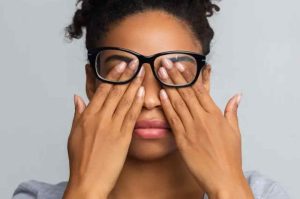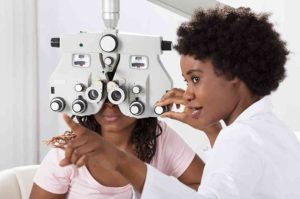
Nigeria is a country with a large population of people who need vision correction. According to a 2019 study, the prevalence of refractive errors in Nigeria was 17.5%, with myopia (nearsightedness) being the most common condition. However, many Nigerians prefer to wear recommended glasses instead of contact lenses for various reasons. In this article, we will explore some of the factors that influence this choice and how glasses can benefit Nigerians with vision problems.

Cost and Availability
One of the main reasons why Nigerians embrace glasses over contacts is the cost and availability of the products. Glasses are generally cheaper than contact lenses over the long term, especially for those who need frequent prescription changes or have complex vision problems. Glasses also do not require additional expenses such as cleaning solutions, storage cases, or eye drops that contact lenses do.
Moreover, glasses are more accessible than contact lenses in Nigeria, where the eye care system is underdeveloped and unevenly distributed¹. Many Nigerians live in rural areas where there are few or no eye care facilities or professionals. Glasses can be easily obtained from local vendors or online platforms, while contact lenses may require a visit to an eye doctor or a specialized store. Glasses also do not need regular replacement or follow-up visits, unlike contact lenses, they have a limited lifespan and can cause complications if not properly fitted or cared for.

Convenience and Comfort
Another reason why Nigerians embrace glasses over contacts is the convenience and comfort that glasses offer. Glasses are easy to use and maintain, as they only require occasional cleaning and adjustment. Glasses can also be taken off or put on at any time, depending on the situation or preference of the wearer. For example, glasses can be removed when sleeping, swimming, or doing other activities that may damage or dislodge the lenses.
On the other hand, contact lenses can be more challenging and time-consuming to use and maintain. Contact lenses require proper hygiene and handling, as they can harbor bacteria and dirt that can cause eye infections or irritation. Contact lenses also need to be inserted and removed carefully, which can be difficult for some people or in some environments. For instance, contact lenses can be problematic in dusty or windy conditions, or in places where there is no access to clean water or a mirror.
Furthermore, glasses can be more comfortable than contact lenses for some people, especially those who have dry or sensitive eyes. Glasses do not touch the eyes, so they do not interfere with the natural tear film or cause dryness or redness. Glasses also protect from external factors such as dust, wind, or sunlight that can irritate the eyes. Contact lenses, however, can reduce the oxygen supply to the eyes, which can lead to dryness, inflammation, or infection. Contact lenses can also cause discomfort or pain if they are not fitted properly, or if they move or tear inside the eyes.

Health and Safety
A third reason why Nigerians embrace glasses over contacts is the health and safety that glasses provide. Glasses can help to correct vision problems and improve eye health, as they can prevent eye strain, headaches, or fatigue that can result from uncorrected refractive errors. Glasses can also prevent or slow down the progression of some eye conditions, such as myopia, by reducing the amount of near work or screen time that can worsen the condition.
Additionally, glasses can reduce the risk of eye infections or complications that can be caused by contact lenses. Contact lenses can introduce foreign bodies or microorganisms into the eyes, which can lead to serious problems such as conjunctivitis, keratitis, or corneal ulcers. Contact lenses can also cause corneal abrasions or scratches, which can impair vision or increase the risk of infection. Glasses, on the other hand, do not pose these risks, as they do not touch the eyes or introduce any foreign substances.
Moreover, glasses can reduce the risk of coronavirus transmission, which is a major concern in Nigeria and around the world. The American Academy of Ophthalmology (AAO) advises that contact lens wearers consider switching to eyeglasses during the coronavirus pandemic. This is because wearing glasses can reduce the need to touch the eyes, which can reduce the likelihood of contracting or spreading the virus. Glasses can also act as a barrier that can protect the eyes from respiratory droplets that may contain the virus.

Style and Preference
A final reason why Nigerians embrace glasses over contacts is the style and preference that glasses offer. Glasses are more than just a functional device, they are also a fashion accessory that can enhance the appearance and personality of the wearer. Glasses come in various shapes, sizes, colors, and styles, so there is something for everyone. Glasses can also be customized to suit the needs and tastes of the wearer, such as having lenses that darken in sunlight or having a coating that protects the eyes from glare.
Furthermore, glasses can reflect the preference and identity of the wearer, as they can express their individuality, mood, or attitude. Glasses can also be a source of confidence and pride, as they can make the wearer feel more comfortable and attractive. Contact lenses, however, do not offer the same level of style and preference, as they are mostly invisible and uniform. Contact lenses can also be less appealing to some people, as they may feel unnatural or uncomfortable wearing something inside their eyes.

Conclusion
In conclusion, there are many reasons why Nigerians embrace recommended glasses instead of contact lenses. Glasses are more cost-effective, accessible, convenient, comfortable, healthy, safe, stylish, and preferable than contact lenses for many Nigerians. Glasses can also help to correct vision problems and improve eye health, as well as protect the eyes from external factors and coronavirus transmission. Therefore, glasses are a better option than contact lenses for Nigerians who need vision correction.
